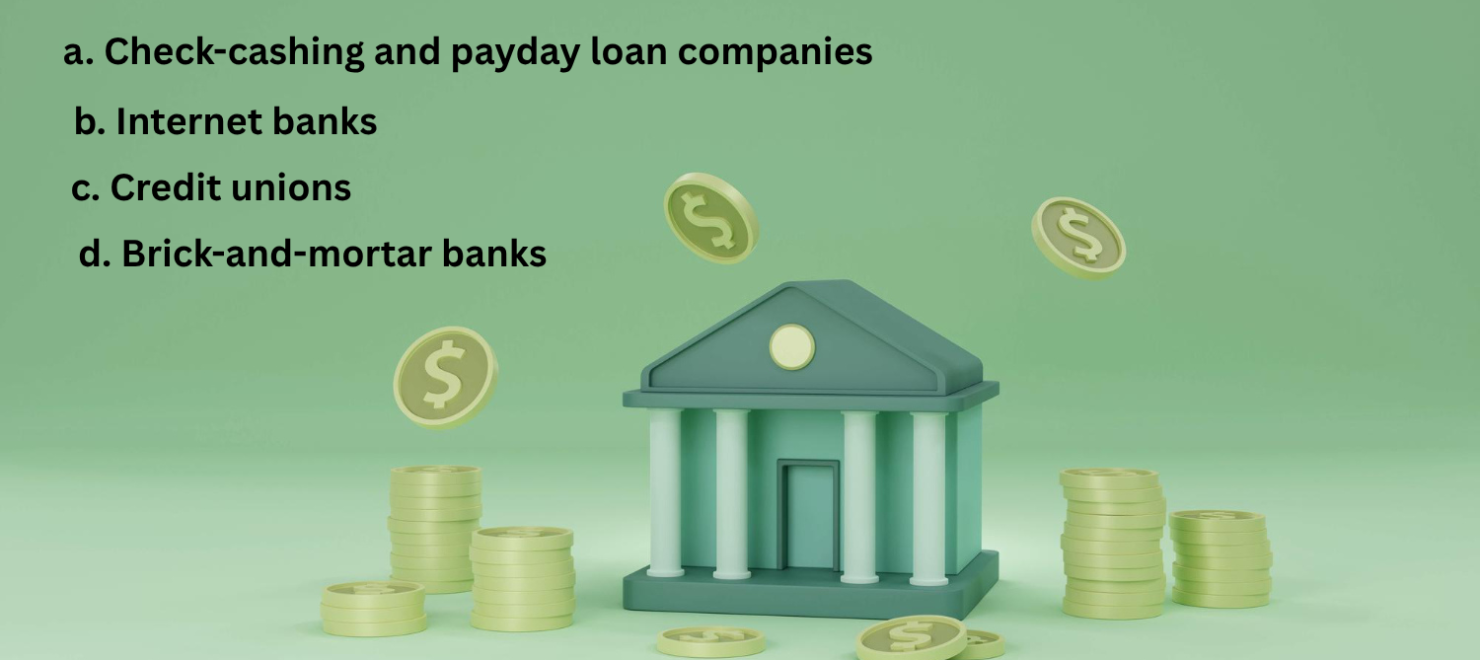Table Of Contents
- Which of the Following Financial Institutions Typically Have the Highest Fees? - Major Players in Finance
- 1. Check Cashing and Payday Loan Companies
- 2. Internet Banks
- 3. Credit Unions
- 4. Brick-and-Mortar Banks
- Which Financial Institution Charges the Most Fees?
- 1. Check-Cashing and Payday Loan Companies
- a) Check Cashing Fees
- b) Payday Loan Fees
- 2. Internet Banks
- 3. Credit Unions
- 4. Traditional Banks (Brick-and-Mortar Banks)
- Fee Comparison for Different Financial Institutions
- How Do Fees Add Up? - Real-Life Impact
- How to Avoid High Fees? - Essential Tips
- Frequently Asked Questions:
- Which of the Following Financial Institutions Typically Have the Highest Fees? - Major Players in Finance
- 1. Check Cashing and Payday Loan Companies
- 2. Internet Banks
- 3. Credit Unions
- 4. Brick-and-Mortar Banks
- Which Financial Institution Charges the Most Fees?
- 1. Check-Cashing and Payday Loan Companies
- a) Check Cashing Fees
- b) Payday Loan Fees
- 2. Internet Banks
- 3. Credit Unions
- 4. Traditional Banks (Brick-and-Mortar Banks)
- Fee Comparison for Different Financial Institutions
- How Do Fees Add Up? - Real-Life Impact
- How to Avoid High Fees? - Essential Tips
- Frequently Asked Questions:
Which of the Following Financial Institutions Typically Have the Highest Fees?
Which of the following financial institutions typically have the highest fees?
- Check-cashing and payday loan companies
- Internet banks
- Credit unions
- Brick-and-mortar banks
The above is a common question that is common among finance learners. The right answer here is option (1): Check-cashing and payday loan companies. However, it is important to know the basic details about each of these options if you want to truly learn how financial institutions work.
Which of the Following Financial Institutions Typically Have the Highest Fees? – Major Players in Finance
If you try to open a bank account or look for a quick loan, you might observe that fees are popping up out of nowhere. This is also true when you want to cash a check. This is common across almost every financial institution.
However, all financial institutions do not charge the same fees. Some of them charge you more, while some charge you less. In addition to that, there are many financial institutions that surround you with many hidden charges.
The following are some of the major financial institutions and their functions you must know about if you want to know about the fees they charge:
1. Check Cashing and Payday Loan Companies
Do you know that you do not always need a traditional bank account to get cash checks and short-term bank loans? There are many financial institutions that offer you that without a traditional bank account. Hence, if you require quick cash, you might choose to reach out to these finance companies.
2. Internet Banks
There are many banks that solely operate through online platforms. Despite that, you will get the benefits of traditional banking services on those platforms. Apart from that, these online banks do not have physical branches. Hence, you might benefit from lower fees and lower costs.
3. Credit Unions
In general, credit unions are member-owned. Also, they work on a not-for-profit financial cooperative model. Apart from that, these credit unions mostly serve particular communities or groups. Moreover, they mostly come with top-end services and lower fees.
4. Brick-and-Mortar Banks
In the traditional sense, these are the main banks where you generally go to keep your money. Also, these are the places where you might first think of applying for a loan. Essentially, these banks come with a variety of financial services.
Meanwhile, you might face higher costs since they have to maintain their buildings. Apart from that, they also need to pay their staff.
Which Financial Institution Charges the Most Fees?
The following are the major financial institutions and the fees that they charge you:
1. Check-Cashing and Payday Loan Companies
When it comes to applying high fees to almost everything, there is no match for check-cashing and payday loan companies:
a) Check Cashing Fees
In general, the average cost of check-cashing is 1% to 6% of your check?s value. For instance, if you want to cash a $320 paycheck, it might cost you $7.49 on average. However, sometimes the cost might increase to $19.20. Hence, do not get shocked when you see those fees.
Just think! If you cash 50 paychecks a year, you might end up paying $374.50 or more solely in fees.
b) Payday Loan Fees
For every $100 that you borrow from payday loan companies, you might have to pay $10 to $30. In fact, for a standard two-week payday loan, the Annual Percentage Rate (APR) is sometimes close to 400%.
For example, if you borrow $300 until your next paycheck, you might have to cough up $45 in fees. Apart from that, if you roll over the loan, the fees will add up faster than you might imagine.
Hence, it shows that check-cashing and payday loans are really expensive. However, they are convenient options and do not require a lot of assurance. Meanwhile, if you do not pay on time, you might get caught in a debt cycle.
2. Internet Banks
In general, banks on the internet come with some of the lowest fees for loans. This is because of the following reasons:
- These banks do not have any branch overhead. Hence, it passes on their savings to their customers.
- In general, you will get access to a variety of perks. These include no monthly maintenance fees and free online transfers. Also, you might get high interest rates on savings.
- If you use an out-of-network ATM, the bank might even reimburse you.
- Sometimes, there are hidden fees. In some cases, banks charge for paper statements or rare services. However, with a few sensible decisions, you will be able to easily avoid them.
Basically, if you feel comfortable banking online, nothing can be better than internet banks. Also, you will also be able to avoid hefty fees.
3. Credit Unions
When it comes to credit unions, they are also known for their low fees and personalized services. The following are some of the major features of credit unions:
- In general, you do not have to pay a monthly maintenance fee. If you have to pay so, it is quite low.
- The overdraft and NSF fees are lower than those of banking institutions. For instance, the average overdraft fee of credit unions is $28.36.
- You will be able to utilize the services of thousands of ATMs for free. This is because most credit unions work through shared networks.
- Sometimes, you might have to pay other fees like loan rates, wire transfers, etc. However, they are mostly cheaper.
If you qualify for a membership at a credit union, you will get some of the most affordable financial services for everyday banking.
4. Traditional Banks (Brick-and-Mortar Banks)
Obviously, traditional banks will charge you more than internet banks or credit unions. However, it is still less than payday lenders.
- In general, the monthly maintenance fees are up to $15. However, if you maintain a minimum balance in your account, they might waive some fees.
- The average overdraft fee of traditional banks is $31.24.
- Banks mostly let you use its ATMs from time to time. However, if you use another bank?s ATM, you might have to pay $2-$3 per transaction.
- You might have to pay other fees in banks like paper statement fees, wire transfers, and more.
- Banks do pay you interest on your savings. However, they charge high interest on loans. This rate is mostly high if you factor in online banks and credit unions.
Traditional banks have been there for centuries. First, they are convenient. Apart from that, they provide a lot of services. However, you still end up paying for the privileges you get. Moreover, you might have to pay if you fail to meet their balance or activity requirements.
Fee Comparison for Different Financial Institutions
The following table consists of a comparison of fees for the financial institutions discussed above:
| Institution Type | Typical Fees | Fees Level |
| Check Cashing and Payday Loan | Check: 1 – 6%. Loans: $10 – $30 for every $100.APR might be up to 400%. | Highest |
| Internet Banks | There are mostly no monthly fees. You have to pay little to no ATM fees.Other fees might be applicable for extra services. | Lowest |
| Credit Unions | There are mostly no monthly fees. The fees for overdraft/NSF are low. | Low |
| Brick-and-Mortar Banks | Monthly fees range from $5 to $15.You might have to pay $2?$3 for other ATMs.Overdraft fees are high. | Moderate |
How Do Fees Add Up? – Real-Life Impact
If you cash your paycheck every two weeks at a check-cashing outlet, you might have to pay an average fee of $7.50 every time. If you add up, it is $195/year. This means you are paying this high amount merely to get your own money.
Moreover, if you add in a payday loan, you might end up spending hundreds of dollars or even more.
Meanwhile, if you keep your money in a credit union or internet bank, you will pay almost no fees. Apart from that, you will even earn some bucks through interest.
How to Avoid High Fees? – Essential Tips
If you want to avoid high fees from a financial institution, do the following:
- Start an account at a credit union. You might also choose an online bank (if eligible).
- Make sure to ask about all possible fees before signing up.
- Always maintain a minimum balance. Also, ask the bank if it charges you monthly for your savings account.
- If you want to withdraw money, always use in-network ATMs. This way, you will avoid unnecessary fees.
- Do not apply for payday loans unless you are really in financial distress. Rather, go for credit unions and online banks.
Frequently Asked Questions:
People go for payday loans and check cashing mostly when they are in financial distress. In some cases, they might have a poor credit score. Otherwise, it is better to reach out to these services as a last resort.
In general, most reputable internet banks are insured and regulated. Hence, choose those banks and financial institutions that are licensed.
In most cases, credit unions have strict membership rules. However, you might even qualify without even realizing it. Hence, it is better to ask around.
Read Also:











Leave A Comment